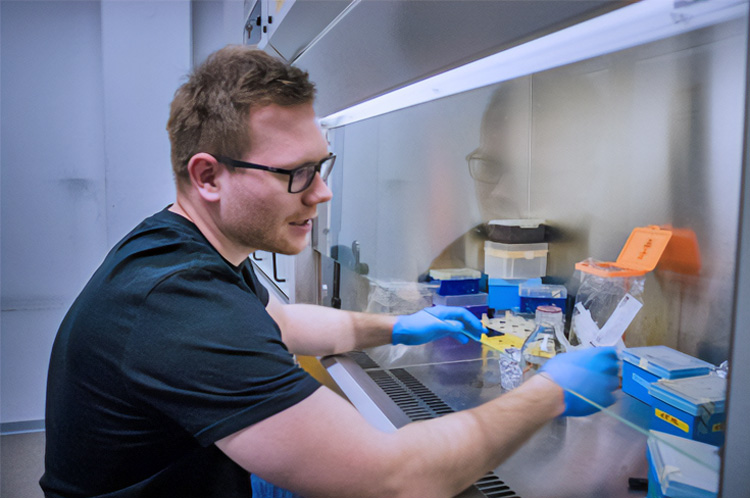“Thanks to the excellent equipment and facilities of the Institute of Molecular Genetics (IMG), I have access to advanced technologies and measurement methods. I also enjoy sharing my knowledge with colleagues and collaborating on joint projects,” says Jiří Březina, M.Sc., a PhD student from the Laboratory of Immunobiology at the Institute of Molecular Genetics of the Czech Academy of Sciences.
Why did you choose immunology and when did you make that decision?
Regarding my interest in immunology, I initially hesitated about which faculty to pursue. I considered medicine, but I felt that the teaching methods at medical faculties didn’t resonate with me. Therefore, the Faculty of Science at Charles University seemed like an interesting alternative to medicine, and in 2014, I decided to study Molecular Biology and Biochemistry of Organisms there.

For my master’s program, I chose immunology because I have been fascinated by the immune system since childhood. I considered immunology a progressive field with many discoveries yet to be made, and its research contributes to the benefit of society as a whole.
What specific research are you engaged in?
During my studies, I focused on central tolerance in the thymus, which involves processes that ensure the elimination of T cells capable of causing autoimmune diseases. My goal was to study antigen transfer, which is the mechanism of transferring unique antigens from medullary thymic epithelial cells to dendritic cells and subsequently tolerizing the repertoire of T cells. I have been working on this topic since 2017 as part of my master’s and doctoral studies.
What scientific achievements have you accomplished during your studies?
During my doctoral studies, we discovered several molecules involved in antigen transfer. Currently, I am investigating whether these molecules are also crucial for the resulting central tolerance. I am also studying the heterogeneity of populations of medullary thymic epithelial cells (MTECs) and dendritic cells in the thymus. I have expanded my interest in this area and identified new populations of dendritic cells in the thymus. This work has provided me with new insights and contributed to a better understanding of the immune system.
Do you plan to continue in this research direction?
Absolutely. I aim to further investigate these populations and gain a better understanding and description of the relationship between specific subsets of dendritic cells and MTECs. Recently, we published an article in the journal eLife that addresses the heterogeneity of antigen-presenting cells in the thymus and their interactions during antigen transfer. It was a significant achievement for me and serves as motivation to continue.
Do you engage in scientific activities outside the laboratory?
Apart from my own work, I actively participate in the academic environment. I regularly lecture in the Advances in Immunology course at the Faculty of Science, Charles University, which has been my favorite subject since my master’s studies.
I have also been involved in organizing PhD conferences and strive to assist bachelor’s and master’s students in their education. I collaborate with a bachelor’s student on their project, and we will continue working together on their thesis. Additionally, I have actively participated in the Czech Young Immunologists group and had the opportunity to present my work at their symposium.
What do you like about IMG, and would you recommend it to other prospective students?
Thanks to the excellent equipment and facilities at IMG, I have access to advanced technologies and measurement methods. I feel comfortable and at ease in the laboratory and throughout IMG. I have sufficient space and resources for my work, which is not always guaranteed.
Moreover, I appreciate the opportunity to share my knowledge with colleagues and collaborate on joint projects. I have the chance to engage in exciting experiments and have the freedom to explore new research directions. I pursue science because it brings me joy, and after all these years, researching tolerance still excites me. That’s why I have decided to stay in the group led by RNDr. Dominik Filipp, CSc., throughout my bachelor’s, master’s, and doctoral studies, and I value this opportunity.